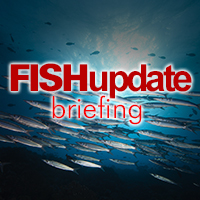Fish Update Briefing, Friday, November 9

ALBATROSS WEAPON AGAINST ILLEGAL FISHING
THE French navy has begun to use albatrosses to help detect illegal fishing, working on the old belief that the birds will always follow trawlers. About 250 albatrosses are being equipped with tiny transceivers that will pick up trawlers\’ radar signals. Their locations will be transmitted to the warships, which will use the data to identify vessels fishing in prohibited waters in the Indian Ocean, off the remote French islands of Crozet, Kerguelen and Amsterdam. France is responsible for patrolling 260,000 square miles of the southern sea. Vessels fishing illegally generally switch off their automatic identification system (AIS) to avoid being tracked by satellite, but they cannot navigate safely without emitting low-level radar signals, which the birds\’ transceivers can detect as they fly overhead.
FARMED SEAWEED COULD ‘STEM CLIMATE CHANGE’
THE cultivation of farmed seaweed is helping to throw new light on to the causes of climate change. The Faroese company Ocean Rainforest hopes it can help combat the impact of rising temperatures by cleaning the seas using seaweed. It says increased carbon dioxide in the atmosphere, mostly due to fossil fuel combustion, is driving up carbon dioxide in the oceans. Like other plants, as seaweed grows, it captures carbon dioxide, and because of its impressive growth rate (about 30 to 60 times the rate of land based plants), it is ideal for mass scale production. Founded in 2007, Ocean Rainforest is one of the few companies in the world that seeds, cultivates and harvests seaweed on a commercial scale in offshore conditions.
DUTCH FISH LANDINGS UP 25 PER CENT
THE amount of fish brought into Dutch fishing ports increased by nearly 25 per cent last year, new figures show. The total volume was approximately 491 million kilos. And in the first nine months of 2018, the quantity of landed fish was almost equal to that in 2017, Statistics Netherlands reports. Between 2005 and 2015, the total quantity of landed fish was in continuous decline. In 2015, this trend was broken and fishing yields doubled relative to one year previously.

